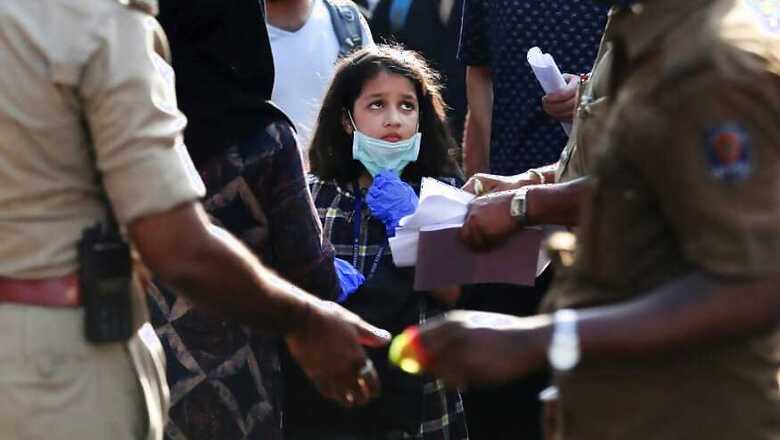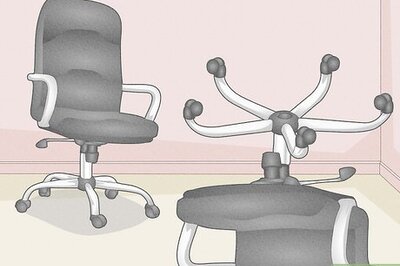
views
On March 18, four persons who had just returned from Germany were de-boarded from Mumbai-Delhi Garibrath Express at Palghar station after fellow passengers spotted home quarantine stamps on their hands. The reaction elicited by fellow citizens was understandable as it showed an evolutionary response: We are hardwired to physically distance ourselves from those who could infect us. We have an entire suite of evolved reaction called “parasitic avoidance”, to prevent us from maintaining contact with others who may carry a communicable disease. These reactions are what make us feel disgusted by signs of sickness, such as vomiting or skin lesions, whether or not these signs represent an actual threat to our health. In this case, the stamp on the forearm ‘stigmatised’ and evoked a certain response from the co-passengers.
These are early signs the Covid-19 outbreak may engender a “new-normal” in nearly all walks of life. The new equilibrium will take some more months to set in and the global pandemic would create a new order in stereotype.
As the coronavirus has disrupted every human activity, there is a perceptible change in the manner in which humans are interacting with each other. It is expected that a huge impact would be felt through disruption in supply and travel chains which would lead to economic slowdown throughout the world. Socially, individuals would avoid crowded places, recreational activities and leisure travel. It would also lead to a lot of intrusion in our privacy due to the need of contact tracing and pandemic control. The changes in socio-economic variables have disturbed the equilibrium and, like thermodynamic equilibrium, the society is moving towards a new equilibrium state, being referred to as the “new-normal”. This “new-normal” would obviously lead to the creation of a “new-normal individual”, with different set of fears and prejudices. The definition of what is rude and uncouth in social behaviour would change, and distrust and suspicion would no longer be treated as immoral or unethical.
In his book, Stigma: Notes on the Management of a Spoiled Identity, Erving Goffmann defines a stigmatised person as “an individual who might have been received easily in ordinary social intercourse possesses a trait that can obtrude itself upon attention and turns those of us whom he meets away from him, breaking the claim that his other attributes has on us, he possesses a stigma, an undesirable differentness from what we had anticipated.” Those who do not depart negatively from the above expectations at issue are termed as “normals”.
Similarly, some religious beliefs may be stigmatised where they are practiced by a minority group while they would be considered normal in places where such religious groups are in majority. This relation has both spatial as well as temporal dimension. For example, Jews who were stigmatised and discriminated against during the early part of the 20th century in Germany are no longer stigmatised or discriminated. It is also true that a socio-religious group which faces stigma in one part of the world might themselves be discrediting other socio-religious groups in other part of the world.
The disruptions set in by the Covid-19 pandemic shall disturb the relationship between the “normals” and the “stigmatised”.
Most illnesses such as tuberculosis, leprosy, diabetes, heart ailments, cancers, and dengue discredit the individual before the ‘normals’ and are often treated differently by them. The reactions can be shown by them in the form of sympathy, fear, hatred, pity, etc. The intensity of the response of the ‘normals’ primarily depends on two variables, the infectious behaviour of the disease and the mortality associated with it. It is, therefore, understandable that the response of the Covid-19 suspects would be to either not to go for the test or not reveal the symptoms in order to hide their failings.
One way of stigmatising the victims is by using a fallacious argument of a “Just World”, which assumes that the failings or a blemish in a person’s ability is the result of an immoral act conducted by the individual in the past.
The impact of the novel coronavirus outbreak shall depend not only on the nature of the virus but also in the manner in which society reacts to disruptions caused by it. The underlying tensions in the social structure, the role of media and social media, along with the survival instincts would set up “new-normals” and alter the relationship between the “new normals” and the “stigmatised individual”, thus opening new pathways of stigmatising and discriminating individuals and groups in the society.














Comments
0 comment